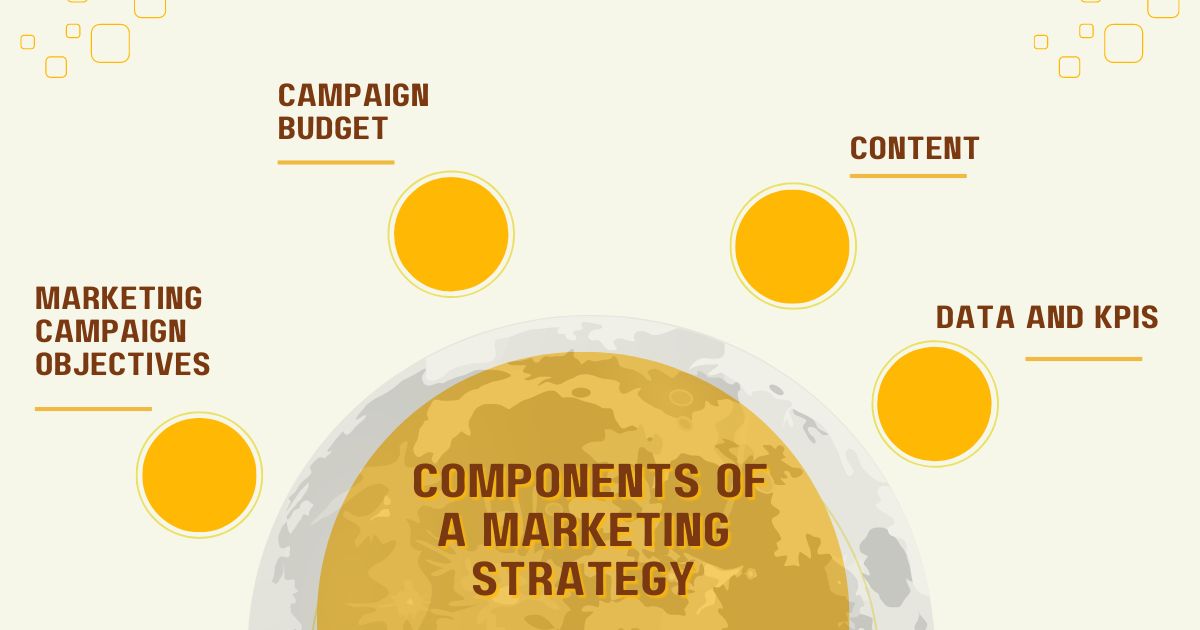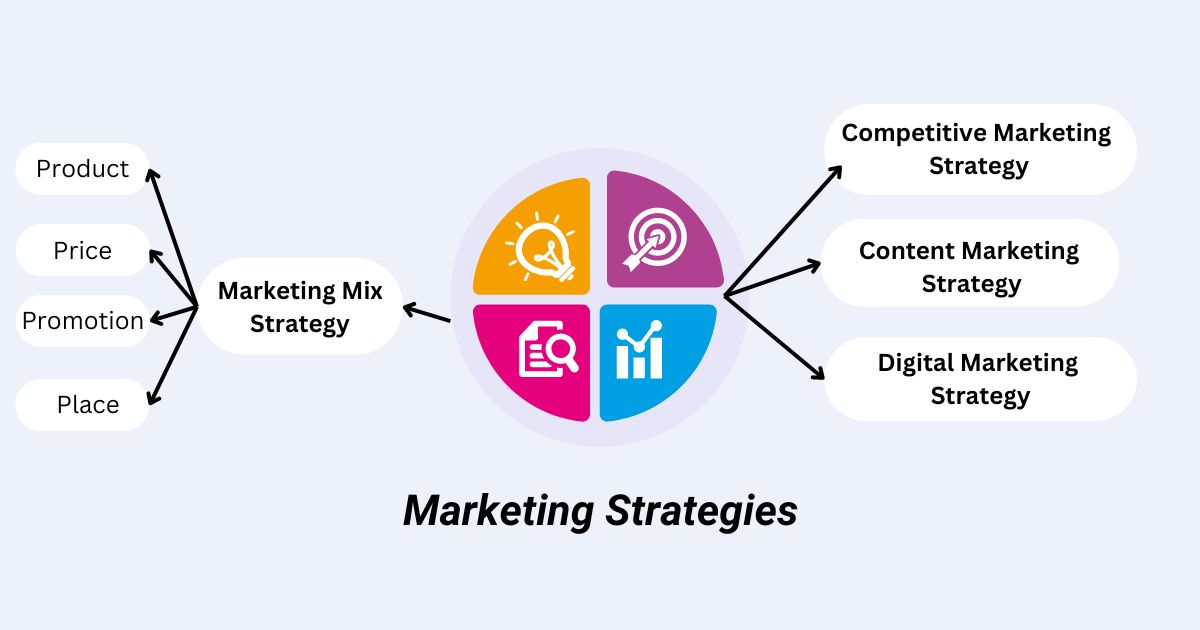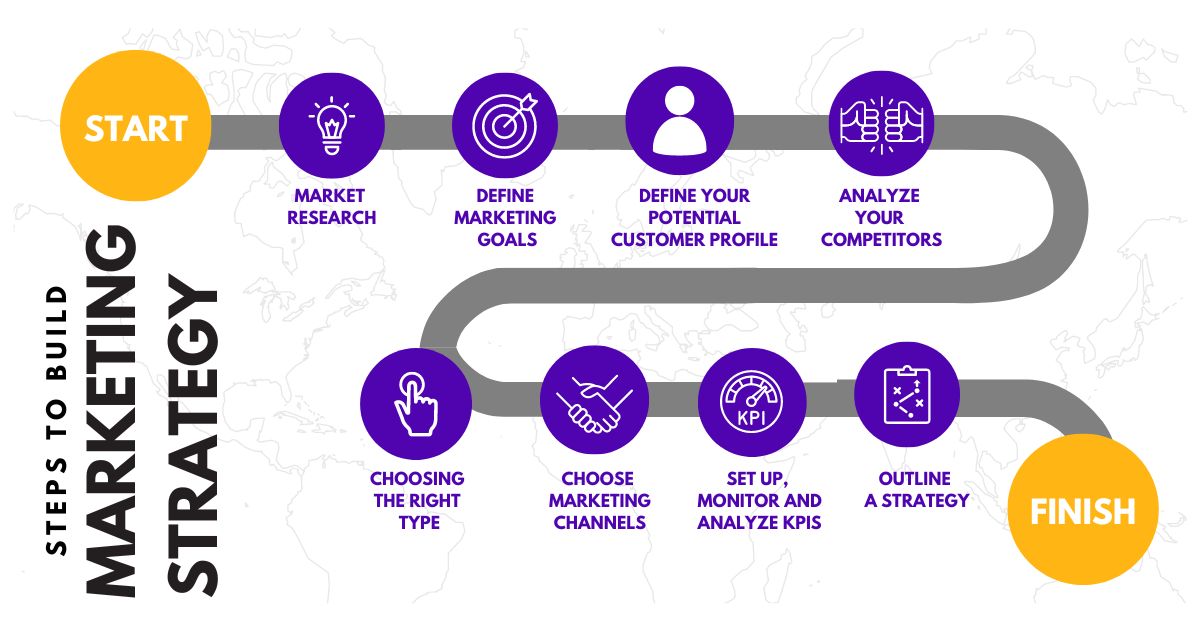What is Marketing Strategy? How to Build & Practical Examples
Marketing strategy is always a hot topic. Since ancient times, commercial activities with competition in buying and selling have formed this concept. And since then, as society has developed, marketing has gradually penetrated many different fields.
Almost every business that wants to survive in the market must do marketing - one way or another. So, to aid you in understanding this concept and more deeply, a specific marketing strategy, we will research to help you learn it right here! Let's find out!
What is Marketing Strategy?

Marketing strategy is a long-term design and overview of the tasks that need to be done to achieve the set goals by clearly understanding the needs or pains of customers. The purpose is to bring solutions to relieve those pains.
A marketing strategy includes many things, from defining goals, understanding customer profiles to deciding which marketing channels to use to reach those customers. These work items will be synthesized into a marketing plan, combined with a system of evaluating and choosing effective tactics, leading to easy control of all your marketing activities.
A good strategy will creatively communicate the company's vision to the market, customers, and employees in the project. It will also focus on long-term goals and directions to achieve those goals.
Why do you need to build a Marketing strategy?
Any work, which implemented according to a pre-established plan will be easily done and have a high success rate. Marketing is no exception. A business needs to identify its purpose and have an implementation plan for implementing marketing campaigns to achieve effectiveness. On the contrary, the business may spend a lot of time, effort, and money on communication activities that do not bring clear results. We are not to mention that it also causes losses, affecting the brand if the path you take is not correct.
Therefore, before starting marketing, you need to take the first step of building a marketing strategy. This step will assist the business in having an accurate direction. At the same time, based on this strategy, marketers can manage the business's activities and allocate resources reasonably. After each campaign, marketers can compare to adjust inappropriate and bad factors to gain experience in the marketing process. This process is the springboard to achieve the best results in the future.
Essential Components of a Marketing Strategy

A comprehensive marketing strategy typically includes several key components that work together to achieve the overall business goals. Here are the main components:
Marketing Campaign Objectives
Either way, you should outline your objectives before you build your strategy. Why? This objective will shape the other components of your plan, including budgeting and content development.
For each objective, you should try to be as specific as possible. One model you should adopt is the SMART model for better. Don't forget that you can always go back and revise your objectives as the situation changes.
Campaign Budget
Budget is an indispensable component of a marketing strategy. If you don't allocate enough budget to promote your campaigns, your marketing campaign will not create a strong effect. On the contrary, if you use too much budget for activities but do not generate profits, your business can incur quite high costs.
Content
User-oriented content – in my opinion, this is the most important thing that determines the success of a strategy. Therefore, there will be notes that you should follow.
First, respect customers, provide them with necessary values and information, do not post content “impulsively” without research and knowing what it is used for. Next, “catch trends intelligently” take advantage of trends to promote your brand’s visibility in the market.
You should also know that a content strategy is not just limited to an article, it can be the use of videos, creative images, podcasts, and other audio content.
Data and KPIs
The last component is the collected data as well as indicators to evaluate the effectiveness of strategic management. It will assist you to visualize how the strategy is progressing and make necessary adjustments. Measurable KPIs contain interactions, conversion rates, lead information, costs spent, etc.
What are the benefits of building a marketing strategy?
Developing a well-thought-out marketing strategy will aid businesses in carrying out professional, on-track, and optimal marketing work.
Understanding customers, markets, and competitors
The Marketing strategy will be built based on a thorough and detailed market research process. Through this process, businesses will better understand the industry, the business situation, and the business's position in the market. Businesses will also know who their competitors are, how they are doing Marketing and business, etc.
From there, businesses can learn, draw lessons, have marketing plans suitable for the industry, and best approach their target customers.
Increase brand awareness and reputation with customers
Building and developing a brand is an extremely difficult task, requiring a long time with the right strategy. When you build the right Marketing strategy, you will know how to reach target customers, how to display to increase awareness, and how to build a brand reputation.
Help allocate reasonable finances for the business
A detailed Marketing plan will include the allocation of human resources and budget for each marketing category. So, businesses can plan the budget and investment costs for Marketing. We can see marketing strategy helps to balance the business's finances effectively.
Build relationships between businesses and customers.
An effective Marketing strategy contributes to increasing the presence of the business in the customer's memory. They understand the brand's products and services clearly. Analyzing customer portraits will show how to provide the exact information to the right audience so that they can make specific decisions.
Thus, Marketing strategy also plays an important role in creating interactions, building relationships between businesses and customers. It is also the core to creating a sustainable foundation for business development.
Popular Marketing Strategies

Each strategy can be used individually or in combination, depending on the business goals, target audience, and available resources.
Marketing Mix Strategy
There are 4 Ps related to the marketing mix. Just one change in the components can create big or small changes for your business. Consider each component in the following order:
Product or service (Product)
The product is the starting point. You need to determine what you are selling. What does it do? What purpose does it serve? What does your product actually “do” to change, improve, or transform the lives of your customers?
These are the most important questions you must ask and answer to form a marketing strategy. You need to consider carefully before answering because this is the focus of the business you will be aiming for.
Price
The second element in the marketing mix strategy is the pricing strategy. Calculate how much your products and services cost to produce, including direct and indirect costs. At the price you charge, can you make a profit?
Price makes the difference between high and low profits. You need to understand that increasing prices by just a few percent can have a strong impact on your profits. In return, reducing costs while maintaining quality can boost sales significantly. That leads to carefully considering before making a final decision.
Promotion
In general, Promotion is a term used to refer to activities that inform customers about products or services and persuade them to buy them instead of competitors.
Here, you need to decide: Who are your customers? What do your customers value? What benefits can your product or service provide to customers that your competitors cannot?
Place
The fourth P is the Place - where you will sell your product or service. How and where will customers buy your product or service? Will they buy it directly from you, from your office or store? Is it mailed or emailed?
Competitive Marketing
Competitive strategy is the key to sales and profit success. This strategy poses a challenge that you must be excellent in a particular area. You can make your product superior to your competitors so that customers will say, "For me, this is the best product or the best service I've ever offered."
You define your competitive advantage - the reason why customers should buy your products. Emphasize the benefits or results that customers will enjoy from using them.
Content Marketing
Clear and easy to understand is the first point to note when building marketing content. In addition, you need to notice the following points:
First, focus on conveying what customers want to receive. "Give before you receive". Content in a marketing strategy must create value for customers, not focus on what you sell, who you are, or how long you have been in this business field.
The message you convey successfully is when it attracts the attention of customers in need, then leads them to make a purchase decision.
Digital Marketing
Online platforms are now a popular channel. The advantage of this strategy is easy to reach many targets, focusing on the right audience and segment. By taking advantage of many creative digital features, the effectiveness of the strategy is optimized, promoting a purchase conversion rate.
To have a successful digital strategy, you need to build a plan with specific goals and metrics. Find out how those platforms operate, and what customers want to receive from them, then design the most suitable roadmap.
Distinguishing between marketing strategy and marketing campaign
Marketing strategy clearly states long-term goals and an overall approach, while marketing plans include each action and detailed steps to achieve those goals.
More specifically, strategy guides the overall marketing activities of the business. It includes setting goals, positioning the brand, and researching the market and competitors.
But, a marketing plan is a detailed roadmap of steps. The plan outlines specific actions to achieve the goals of the strategy.
Steps to Build an Effective Marketing Strategy

If you want to build an effective marketing strategy, you need to understand your market, define your goals, and execute tactics to achieve those goals. Here are the steps to create an effective strategy:
Market Research
Before starting to create a specific marketing strategy, you need to collect necessary data such as market size, purchasing power, raw material supply, etc.
Understanding these things will help your business make the most practical decisions. It also makes it easier to understand your target market, find a niche, and take advantage of resources. This process is also essential to get your customer's picture and adapt to changing trends.
Define Marketing Goals
After you have enough necessary data, you will be ready to set some goals. Determine what you want to achieve from this strategy.
Whether your goal is to raise brand awareness, drive sales, or introduce a new product, clearly defined goals will guide your marketing strategy.
Note that your strategy goals should reflect your business aspirations, aligning your strategies with your ultimate goals.
Define Your Potential Customer Profile
No matter what your strategy is, you need to understand who your target audience is. Do market research to grasp your target audience and the market landscape. The customer data collected in the first step is an important component of this step.
However, knowing your target audience is not enough. Once you have identified your target audience, you need to know what they want, not only their needs and pain points but also how your product can solve that problem.
Your potential customer profile should be demographic and behavioral, including name, age, job title, income, location, interests, and needs.
Analyze Your Competitors
After understanding your customers, the next step is to know who your competitors are.
Research how they operate from their websites, content, advertising formats prices, etc. It is an effective way to "know yourself," thereby identifying opportunities to do better and create a prominent difference for your product. Researching your competitors also shows you the mistakes to avoid and determine which marketing tactics are most effective.
Choosing the Right Type of Marketing Strategy
Once you have all the necessary information, you must determine which type of strategy is suitable for your situation. There will be many ways to understand and classify different campaigns.
Choose Marketing Channels
The next thing to decide is where to convey it. The top goal at this step is to choose the right communication channel that suits the usage habits of the target customer group.
Let's start with the communication channels you are using. Then, consider combining traditional and digital channels such as social networks, TV, email, podcasts, SEO, PR, or influencers.
Set Up, Monitor and Analyze KPIs
For newbies, most of them are often interested in the above steps. That is, setting up, implementing, researching, etc., and often ignore the work of recording and evaluating the effectiveness of the marketing strategy. So how to evaluate?
It is not about looking at the number of likes, shares, comments on posts. As long as these numbers are high, the campaign is successful? Of course, it won't be that easy!
It will depend on your goals to consider this. What I want to emphasize here is the ability to read the numbers. Be equipped with the ability to analyze KPIs, how track data, and look at the data to understand many stories behind it. Thereby, you can maintain flexibility, refine strategies, and adapt to changing customer needs.
Outline a Strategy
The final step is to outline a complete strategy and put it into practice.
Marketing strategies of famous brands
Every business with a proper and systematic marketing strategy will reap success. And there has been a lot of evidence for this argument. Let's analyze the marketing strategies that big brands are applying.
Apple's Marketing Strategy

Apple has long not had to spend too much money on advertising new products. They rely on the strategy of creating rumors, also known as word-of-mouth marketing, to make users excited and look forward to their upcoming products.
According to Bloomberg, since the first generation of iPhone was launched in 2007, the press has been especially fond of Apple products. Without the company having to advertise, the media has raced to exploit news about the company's new products.
In the following periods, Apple's new products were always exploited quickly. Even though Apple has not revealed any information about the product, rumors from the media have made the new iPhones ready to be released become "super products." Apple also creates a feeling of "slow to miss" and a "follower" mentality for customers.
In fact, this strategy of Apple actually appeared in 1984 in the "Big Brother" advertisement. And a message has been conveyed to the whole generation "Throw off your shackles. Break the status quo. Think different.”
Chanel's Marketing Strategy

Chanel is famous for its 3 no strategy: No fakes - no selling on social networks - no attention to competitors.
They create a difference from other competitors. There is no denying that this strategy has contributed to their success from the past to the present.
About product strategy: They build a product line in their style, are elegant, polite, and do not follow any trends.
Not interested in competitors: No matter what moves competitors make in terms of products or communications, Channel always goes its way, doing its job well.
Social networks are where the Channel shows its class, not to sell products. They also do not often respond to comments but focus on taking care of customers who come to choose their clothes. They position the brand with a luxurious, slightly arrogant but different way of behaving.
Frequently Asked Questions about Marketing Strategy
Here are some frequently asked questions (FAQs) about marketing strategy:
Can you run multiple Marketing strategies at the same time?
Running multiple Marketing strategies at the same time will be a test to help you find an effective strategy. However, please make sure that each strategy you have invested in properly and thoroughly to make sure it is beneficial for your business. Once you have found the right marketing strategy, you should focus on that strategy to achieve optimal efficiency.
Does Marketing Strategy Affect the Success of a Business?
The answer is yes. Not only does Marketing Strategy affect a business, but it also has a very big impact. If your business has a good product, but no customers come to you to buy and use your product, your business will soon go bankrupt.
A systematic and suitable strategy for the business's products will assist the business develop quickly. At the same time, it will bring huge revenue and profits to the business.
Does running a marketing strategy cost a lot?
The cost of a marketing strategy depends on the scale and implementation method. And in the process of developing a strategy, you also need to pay attention to your budget and business goals. These are two important factors in orienting the construction of the right strategy.
How do you measure the success of a marketing strategy?
Success is measured by tracking key performance indicators (KPIs) that align with your marketing goals. Common KPIs include:
Conversion Rate: The percentage of visitors who take the desired action (making a purchase, signing up for a newsletter, etc.).
Return on Investment (ROI): The revenue generated compared to the cost of the marketing efforts.
Customer Acquisition Cost (CAC): The cost associated with acquiring a new customer.
Customer Lifetime Value (CLV): The total revenue expected from a customer over their relationship with your brand.
Engagement Metrics: Likes, shares, comments, and other forms of engagement on social media and other platforms.
How often should a marketing strategy be updated?
A marketing strategy should be reviewed and potentially updated regularly, typically annually, or whenever there are significant changes in the market, customer behavior, or business objectives. Continuous monitoring and adjustments based on performance data with the purpose of keeping the strategy effective.
Conclusion
Marketing strategy plays an important role in the success of the business and promoting the brand. You need to clearly understand the nature of marketing strategies and apply them to be able to bring high efficiency. Hopefully, the above information that Skilltrans provides will be useful to you.
If you want to learn more about Marketing in general and business knowledge in particular, register for Skilltrans courses today. Many worthwhile courses are waiting for you to discover.

Meet Hoang Duyen, an experienced SEO Specialist with a proven track record in driving organic growth and boosting online visibility. She has honed her skills in keyword research, on-page optimization, and technical SEO. Her expertise lies in crafting data-driven strategies that not only improve search engine rankings but also deliver tangible results for businesses.



